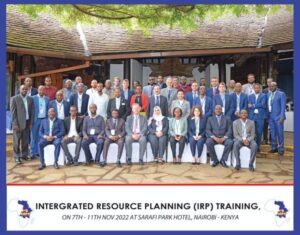Integrated Resource Planning (IRP) Training for Decision Makers in the Eastern Africa Power Pool (EAPP)
About the Training Workshop
Integrated Resource Planning (IRP) is an approach to national power system development planning that incorporates a holistic assessment of available energy resources and opportunities for demand-side management. With World Bank support, Economic Consulting Associates (ECA) has been contracted by EAPP to provide a 5-day Integrated Resource Planning training course for decision-makers from the current and prospective EAPP member countries.
Workshop Objectives
The Workshop Objective is to provide decision-makers in utilities, ministries, and regulators of EAPP member countries with a thorough understanding of the principles and best practices of Integrated Resource Planning in the power sector. The workshop will support members in initiating or enhancing IRP in their respective sectors and learning more about current planning practices in the region, enabling greater regional integration in planning.
Workshop Supported by
Workshop Evaluation
Click here to evaluate the Workshop
Hourly Schedule
Monday -Introduction to Intergrated Resource Planning
- Session 1: Importance of IRP training for decision makers
- Objective: Introduce the concept of an IRP and the importance of decision makers understanding key practices and approaches in power sector planning
- Session 2: Generation and transmission planning – the heart of an IRP
- Objective: Understand what an IRP is, the key components and processes, and what information an IRP may provide
- Session 3: Power planning practices in the EAPP and further afield – a stocktake
- Objective: Review the power planning practices currently employed in the EAPP member states and in other jurisdictions
- Session 4: Developing an IRP – Essential tools and data
- Objective: Understand the data that is required to produce an IRP and the range of tools and programmes that can be utilised in the IRP process
Tuesday - Demand and load forecasting
- Session 5: Load forecasting essentials
- Objective: Understand what load forecasting is, the different approaches that can be taken to load forecasting, and the importance of load forecasting in an IRP
- Session 6: Energy efficiency – reducing energy demand growth
- Objective: Explore how energy efficiency measures can be a least cost option to reduce demand and the implications for load forecasting
- Session 7: Tariff policy and demand side management
- Objective: Assess how tariffs can be used to influence demand patterns and the implications for IRP
- Session 8: Distributed generation and rural electrification – implications for load forecasts and IRP
- Objective: Understand the impacts of distributed generation technologies for load forecasting and power sector planning more broadly
Wednesday – Generation and transmission planning
- Session 9: Making sense of generation costs, avoided costs, LCOE and LCOE limitations
- Objective: Understand different generation cost concepts, such as the levelised cost of electricity (LCOE) and avoided costs, as well as their limitations
- Session 10: Criteria for power sector planning
- Objective: Understand different criteria that are used in power sector planning
- Session 11: Optimisation of dispatch and investment projects
- Objectives: Enhance understanding of least cost planning and the concept of economic dispatch, including how variable renewable sources are treated.
- Session 12: Transmission network planning
- Objective: Develop an understanding of the principles of transmission network planning in the context of an IRP
Thursday – Topical issues for power sector planning
- Session 13: Renewable energy and decarbonisation targets and their implications for IRP
- Objective: Explore the importance of renewable energy and decarbonisation targets and their impacts on power sector planning
- Session 14: Climate resilience and decision making under uncertainty
- Objective: Understand how uncertainty – including the potential impacts of climate change - can be factored into the planning process and the tools that are commonly applied.
- Session 15: Social and environmental considerations in an IRP
- Objective: Appreciate that the IRP approach takes into consideration a range of social and environmental factors and understand how these fit into the planning process
- Session 16: Private sector participation and opening domestic markets to wholesale competition
- Objective: Understand the role of private sector participation in IRP and the implications of potential changes to domestic markets, including a move towards a wholesale market, on power sector planning.
Friday – Formulating and implementing an IRP
- Session 17: Regional integration – next steps in the EAPP and implications for IRP
- Objective: Explore and discuss regional integration – both within EAPP and across the Continent – and the implications for power sector planning
- Session 18: Stakeholder engagement in power sector planning
- Objective: Review the importance of engaging a wide range of stakeholders in power sector planning, including in the development and implementation of an IRP
- Session 19: Introducing an IRP – a practical guide to commissioning, implementing, and updating an IRP
- Objective: Understand the steps that need to be taken to commission a successful IRP, implementing the plan, and updating it
- Session 20: Course re-cap and closing remarks
- Objective: Summarise the key lessons learnt over the past week and offer an opportunity for participants to ask any outstanding questions





